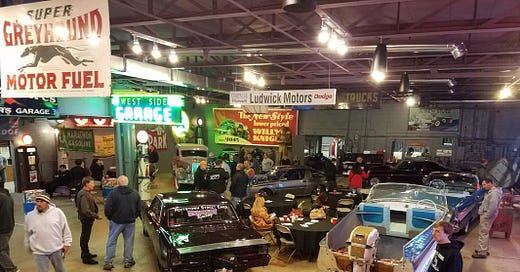Collectible Car Storage: A Story of Garages and Community
More than just storage businesses, some classic and exotic car garages have become social clubs and gathering places for a growing "gearhead" community... and a big real estate opportunity.
Thesis Driven dives deep into emerging themes and real estate operating models by featuring a handful of operators executing on each theme. This week’s letter is a deep dive into collectible car storage.
While the self-storage sector as a whole has languished and consolidated in recent years, one segment has developed rapidly without drawing much attention: the storage of classic and exotic cars.
The classic car market as a whole has experienced dramatic growth over the past several years. Hagerty estimates there are now 31 million collector vehicles in the United States, with annual auction volume over $2 billion, a 20% year-over-year increase. And since almost 90% of collector car transactions happen in private sales—not auctions—it’s likely the total transaction volume is closer to $20 billion per year. All those cars need a place to go, and real estate investors and entrepreneurs—most of them small—are filling the need while embracing a variety of business models and value propositions.
While the average classic car collector is still older, wealthier, and more male than the typical American, car collecting as a hobby doesn’t seem to be going the way of golf. More Millennials and Zoomers are gaining interest in car collecting as events like RADwood reach younger audiences by featuring 1980s and 90s-vintage cars.
Indoor, climate-controlled storage is particularly important to owners of collectible cars, many of whom view their cars as an investment. Outdoor storage—even under a tarp or protective covering—can lead to deterioration and loss of value. So many owners are willing to pay a premium for high-quality, climatized space.
It is tempting to view classic car storage as simply a sub-category of the broader self-storage sector. After all, most car storage and self-storage businesses share a model: individuals pay money to rent (or buy) industrial-ish space to store things. But that would miss a big aspect of the trend and business opportunity. The stuff in that storage space isn’t just some junk left over from the customer’s last move; rather, it’s often a fundamental part of his or her identity.
And for many classic car collectors, that identity is tied a robust social community. In a world where men suffer from increasing loneliness, there’s a clear need for shared interest groups and gathering space. Operators have taken note, and the companies we’ll profile today exist on a spectrum ranging from “self-storage with a bar” to “a membership club with a big garage”. But in all cases, classic car businesses aren’t just tapping into a utilitarian need but the “gearhead” identity and community that underlies it.
So in today’s Thesis Driven we'll tackle:
Classic car storage business models and economics;
Major players in the category;
Real estate economics and opportunities;
Trends and future directions of the sector.





